People with dementia often face significant challenges when communicating with others. They may not be able to remember how to use the phone or may not be able to understand what people are saying to them. This can make it hard for them to stay in touch with friends and family. Those with dementia usually have a more challenging time using traditional telephones.
However, not staying in touch with loved ones can reduce seniors' life span, per several studies. End isolation and depression by getting your loved senior a dementia-friendly phone after reading this guide.
While getting a dementia-friendly phone, you also need a landline service that supports your loved senior and their caregiver.
Pair your dementia-friendly phone with reliable home phone service from Community Phone. Stay in touch with your loved one with unlimited nationwide calling and protect them from fraudsters with a robust spam call blocker. Read on to learn how Community Phone offer cheap home phone for seniors affected by dementia.
6 Best Landline Phones For Seniors With Dementia
1. Future Call FC-0613 Picture Phone for Seniors
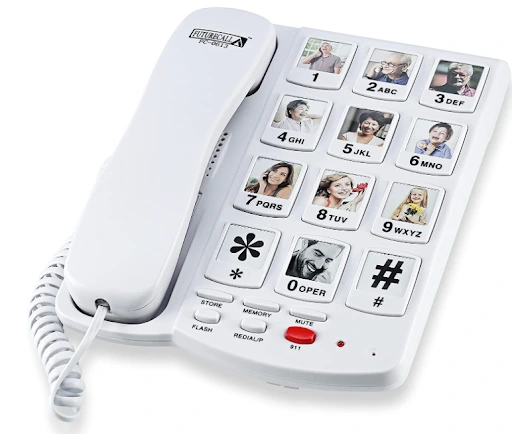
Features
- The Future Call FC-0613 is an excellent choice for those with memory impairments, as it features a unique memory dialing function.
- This phone also has an amplified speaker, making it easier for those with hearing problems to communicate with others.
- The One Touch Dialing feature makes it easy for seniors to place calls without fumbling through menus and trying to remember numbers.
- The FC-0613 also has an emergency SOS button that immediately connects the senior to a caregiver or emergency service if the need arises.
These features make the FC-0613 an ideal phone for seniors with Dementia.
Price: $49.99
2. SMPL56010
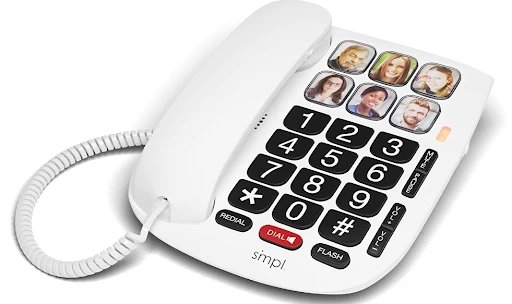
Features
- The SMPL56010 is another excellent phone ideal for seniors with Dementia.
- It has large buttons and a bright, easy-to-read display. It also has pre-programmed speed dial buttons and an emergency SOS button.
- The SMPL56010 also has a built-in answering machine, so seniors can easily listen to messages from loved ones.
- The SMPL56010 also includes features like voice recognition and amplified sound, which can be helpful for seniors who have difficulty hearing or speaking.
These features make the SMPL56010 an ideal phone for seniors with Dementia.
Price: $49.99
3. Future Call FC-1007SP
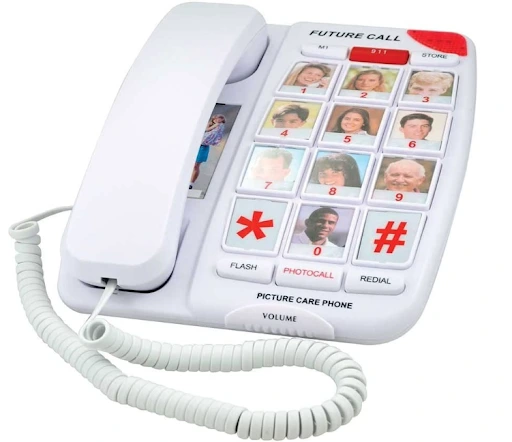
Features
- Traditional cell phones are designed for people who can remember complex tasks and follow detailed instructions. But for seniors with Dementia, even simple tasks like answering a call can be complicated.
- Future Call FC-1007SP features large buttons, making it ideal for dementia-affected seniors.
- The phone also has a built-in photo memory function, which helps seniors remember who they are talking to.
- With volume controls to help people with hearing difficulties staying in touch with loved ones can be more pleasurable for your loved senior.
- The emergency 911-key can be a lifesaver when alerts need to be sent out to emergency services.
Price: $45.09
4. Serene Innovations HD40P
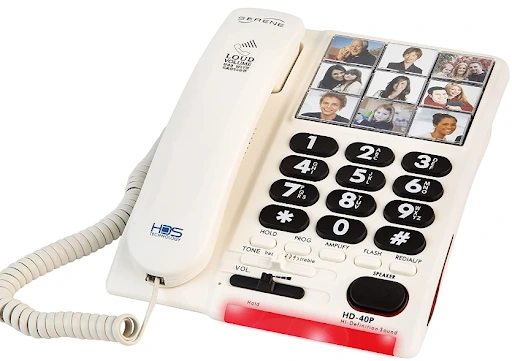
As people age, they can experience difficulties using regular phones. This is especially true for seniors with Dementia. They may have problems knowing how to use the buttons or where to place the phone when they want to make a call. They may also forget people's phone numbers or their own.
Features
- The Serene Innovations HD40P has large, brightly-colored buttons that are easy to see and press.
- It also has pre-programmed buttons that can be customized for frequently called numbers.
- It has an amplified speaker that makes hearing the person on the other end of the line easier.
- A visual ring indicator can indicate an incoming call to ensure your loved senior does not miss those precious moments with you.
These features can make a big difference in helping seniors stay connected to the people and things they love.
Price: $99.95
5. Dododuck Phone
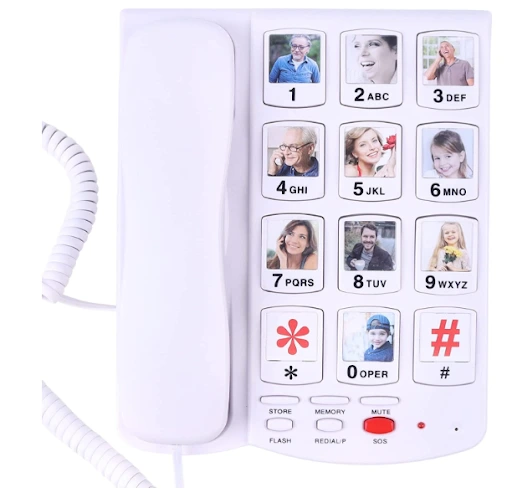
Difficulties with traditional phones, including small screens and tiny buttons, can be even more pronounced for seniors with dementia.
Features
- Dementia-friendly phones like the Dododuck have large screens and backlights, making it easy for seniors to see, while the keypad is highly visible and makes little noise when pressed.
- The phone is designed to be easy to use, with large buttons and clear text.
- They also have extra features that can be helpful for seniors with Dementia, such as GPS tracking and pre-programmed emergency numbers.
- The phones also have a built-in magnifier for those with poor vision.
Price: $29.99
6. No Dial Telephones
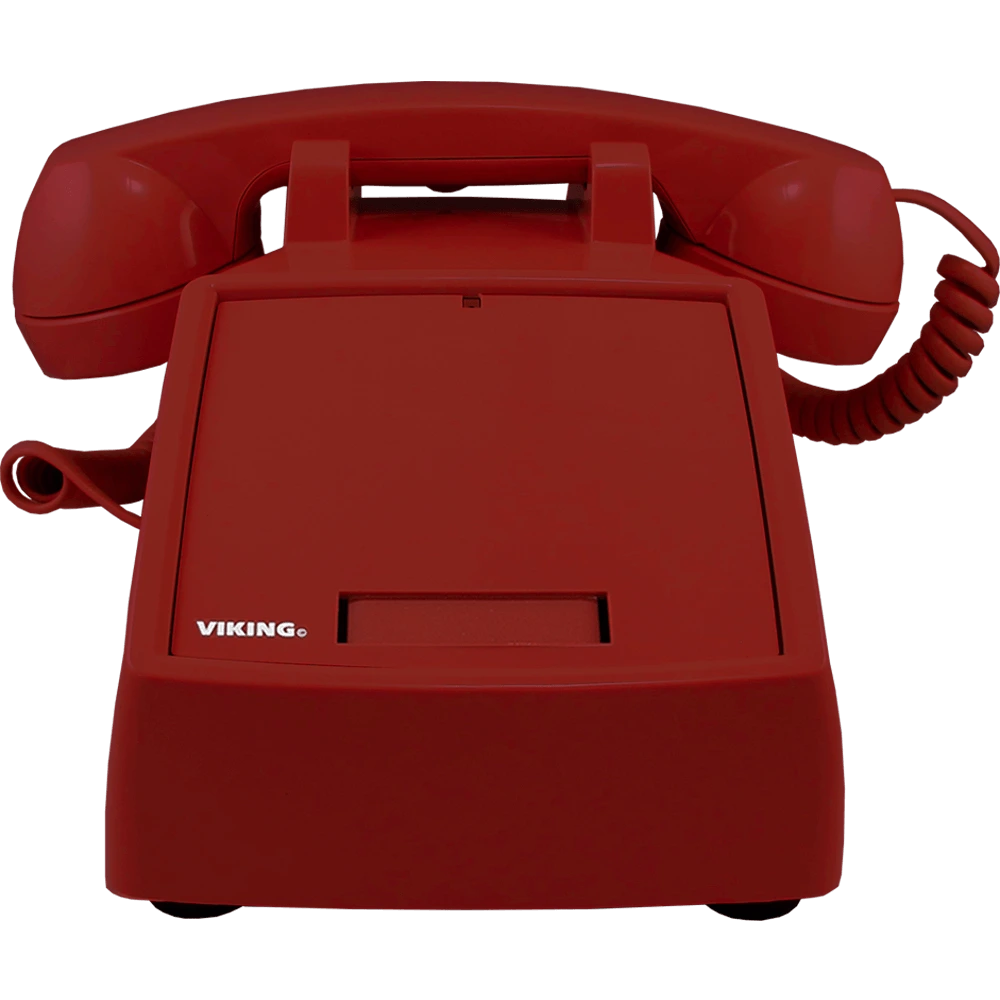
Sometimes, seniors with dementia have compulsive calling habits, much to the dismay of their caregivers and loved ones. Obsessive calling can sometimes lead to costly 911 calls or penalties. For seniors with this disorder, specialized dementia-friendly phones can significantly help. These phones only allow incoming calls, so the senior won't be able to make any unnecessary calls. This can help to reduce stress for the caregivers and save money.
Price: $59.95
Community Phone: The Best Phone Service For Dementia-Friendly Phones
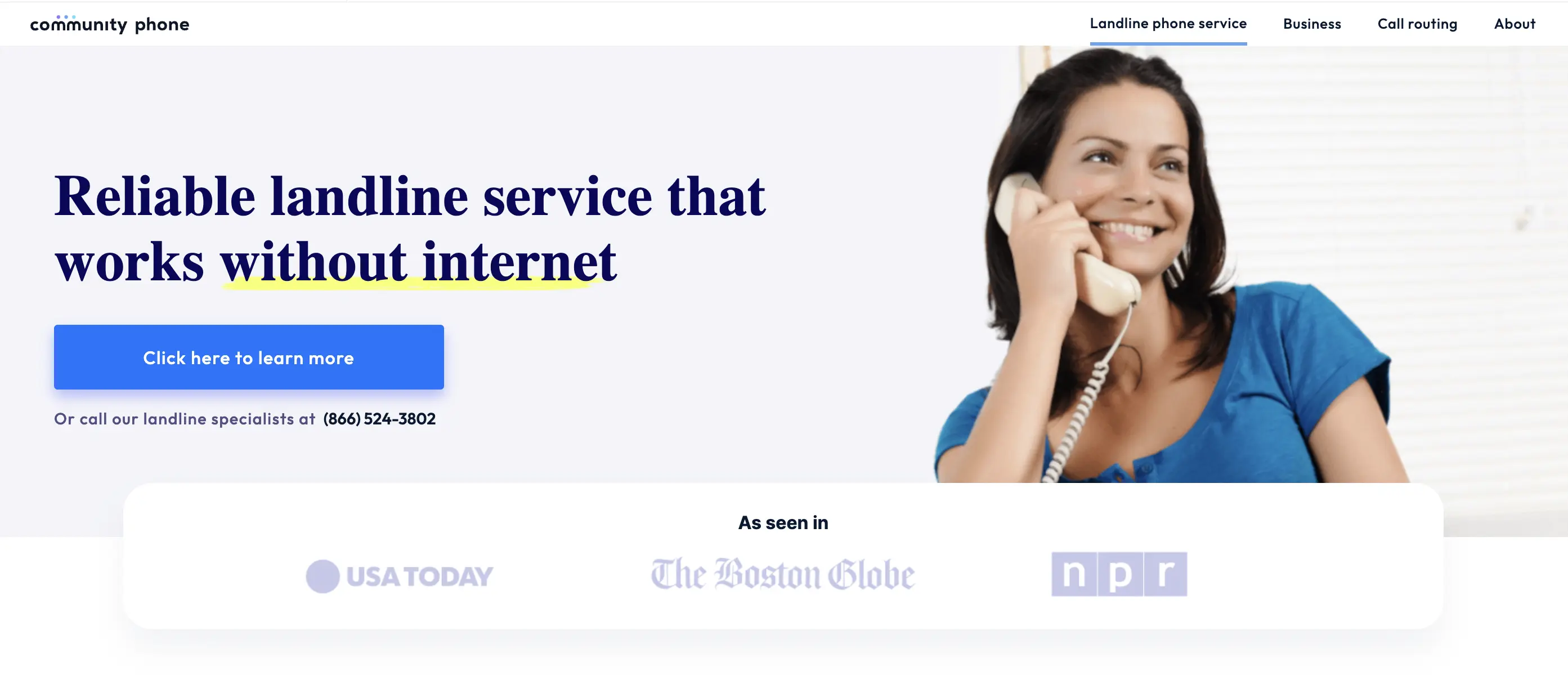
Dementia can be challenging for the affected individual and the caregiver. To help dementia-affected individuals stay in touch with their loved ones and slow the progression of their disease, pair dementia-friendly phones from above with Community Phone, the best home phone service for seniors in the U.S.
Your loved senior or you need not spend money installing copper or fiber-optic cables for your phone, as the Community Phone Base works off of cell towers in your area. You or a caregiver can set up the Community Phone base in under 30 seconds in 2 steps. Your loved one can experience the reliability of a landline and the freedom of wireless access with Community Phone.
No more dropped calls, latency, or phone lines being down when the power or internet goes down, as Community Phone does not need the internet or copper wires to operate.
Primary Features Of Community Phone
1. Unlimited Nationwide Calling
Assure a dementia-affected senior of your love and support by enabling them to stay in touch with you and other loved ones with Community Phone’s unlimited nationwide calling.
2. Spam Call Blocking
Protect your loved senior from fraudsters and scammers with Community Phone’s spam call blocker service. Depending on your choice, Community Phone can protect a dementia-affected old in 2 ways:
- Allowing calls only from whitelisted numbers
- Challenging robocalls and blocking them before your phone rings
3. Seniors Get Only Calls From Numbers That Are Whitelisted
When you program your senior’s phone to receive calls only from whitelisted numbers, you have complete control over who they can talk to. All calls other than the ones from the whitelisted numbers will be blocked from reaching the senior’s phone. No more annoying telemarketers or scammers - just peace of mind for seniors and their caregivers.
4. Robocall Challenge
The second option is where the robocall blocker asks the caller to press 1 or announce their name before the phone rings. Since robocalls cannot press any numbers, the call will be blocked before the phone rings.
5. affordable home phone service
Community Phone saves you hundreds of dollars in installation costs as you do not need a technician to install the phone. You can also save on hardware as you won’t need copper or fiber-optic cables.
Recent market analysis revealed that Community Phone’s home phone service is 31-35% cheaper than a traditional landline, 20-25% cheaper than VoIP-based phones, and a whopping 73% cheaper than a cell phone.
Talk to Community Phone’s specialists to choose your best plan.
6. Portable
The portability of Community Phone’s home phone service has made it a favorite among seniors. Your loved senior can take the landline when moving to an assisted living facility without changing their phone number. The Community Phone base works anywhere there is power and cell service.
Benefits Of Switching To Community Phone
- Community Phone is an excellent option for seniors with Dementia. There are no contracts or hidden charges, and the quick setup of the Community Phone base saves money on installation.
- Cost-effective and affordable plans with customer-friendly cancelation policies, with a 14-day risk-FREE trial.
- It does not need internet or a copper wire connection to operate
- 24/7 reliable customer support will help answer your questions or solve your issues patiently.
Why Do Dementia-affected Seniors Need A Landline?
One of the ways to help seniors with dementia is to ensure they have access to a landline phone. Access to a landline can significantly affect their ability to stay connected and be independent. Some other reasons dementia-affected seniors need landlines are:
1. Reduce the Sense Of Being Alone
Many seniors who live with dementia feel isolated and alone. A landline telephone can help reduce this sense of isolation by providing a way for the senior to stay in touch with friends and family.
2. Reduced Stress and Anxiety for the Elderly and Caregivers
Using a cell phone or other devices can require cognitive skills that people affected by dementia may have difficulty with, leading to unwanted stress. Since seniors are familiar with landlines and can operate them on muscle memory, encouraging them to use a landline can ease the pressure on them and their caregivers.
3. Slowed Disease Progression
Staying in touch with loved ones can slow the progression of dementia, allowing the person affected to lead a decent quality of life.
Frequently Asked Questions
Should People With Dementia Have A Phone?
Yes, people with Dementia should have a phone. Having a phone can help restore a dementia-affected person’s ability to communicate with loved ones and stay connected to the world around them. People with dementia or their caregivers need a reliable landline here to contact emergency services if they need help. They may also need to contact family or friends for support, and a landline provides a more reliable connection than a mobile phone.
Should A Dementia Patient Have A Phone?
There is no definitive answer, as each person's situation is unique. However, some things to consider when deciding if a dementia patient should have a phone are:
- How well the person can handle having a phone. If they are easily confused or forgetful, having a phone may only add to their stress and confusion.
- Can the person use the phone safely? For instance, if they are prone to wandering, having a phone with which they can walk around may not be safe.
Ultimately, it is up to the individual and their caregiver to decide if a phone is right for them. If you decide that a phone would be beneficial, you can opt for dementia-friendly phones and pair it with Community Phone, the best home phone service for seniors in the U.S.
What is A Dementia Phone?
A dementia phone is designed specifically for people with dementia. These phones have big buttons, backlights, and extra loud volume. You can program numbers for speed dial and insert photos next to the numbers to help seniors who tend to forget numbers and names.
Some of these phones have speech-slowing technology that helps dementia-affected people better understand the person at the other end. They also have features like GPS tracking and pre-programmed emergency contacts.
Conclusion
When looking for the best telephones for seniors with dementia, you must consider factors like call quality, affordability, and features that factor into the challenges they would have.
Pair your dementia-friendly phone with Community Phone’s home phone service and ensure your loved senior can stay in touch with you and other loved ones. Utilize the many features to protect your loved one and alleviate their stress.
